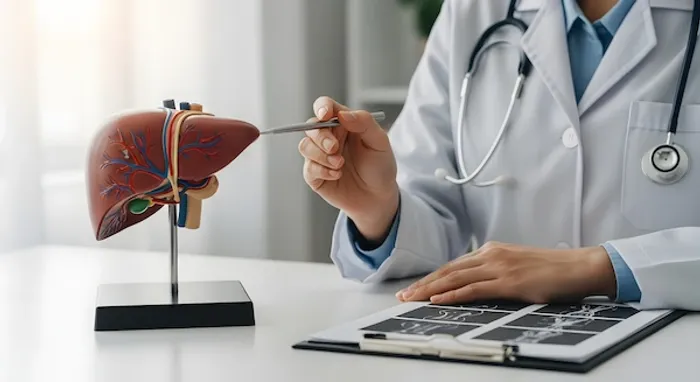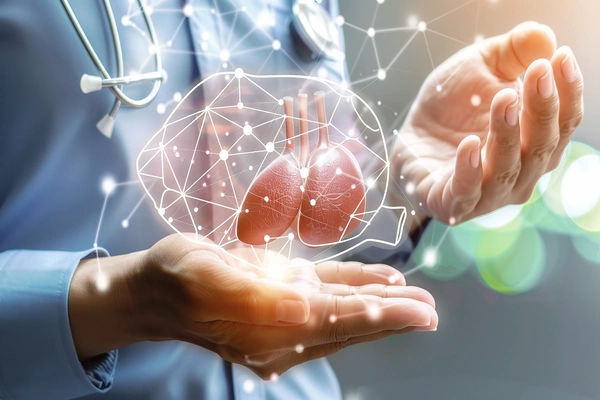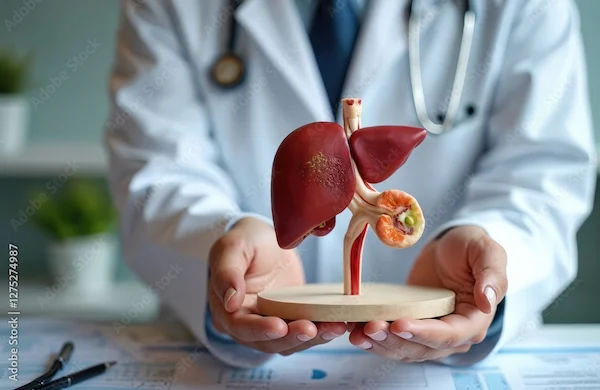The Essential Link Between Vitamin D and Your Liver Health
Discover how vitamin D and liver health are deeply connected, why deficiency is common in liver disease, and practical steps to protect both.


Introduction
We often praise vitamin D for strengthening our bones and boosting immunity, while the liver is celebrated as the body's ultimate detoxifier. But did you know these two powerhouses are in a constant, intimate dance? Your liver isn't just processing toxins; it's the critical factory that activates the vitamin D you get from sunlight and food, turning it into a form your body can actually use. When your liver is healthy, this process runs smoothly. However, if liver function is compromised—as in conditions like fatty liver disease or cirrhosis—it can throw your entire vitamin D system out of balance, leading to deficiency and a cascade of other health issues. Conversely, low vitamin D levels can exacerbate liver inflammation and damage. This article will guide you through this essential partnership, explaining how your liver and vitamin D work together, the risks when this relationship falters, and the practical steps you can take to support both for your overall well-being.
What Exactly Does Your Liver Do?
The Liver's Multitasking Marvel
Your liver is one of the hardest-working organs in your body, performing over 500 vital functions. Located in the upper right quadrant of your abdomen, it acts as a processing plant, a storage unit, and a purification centre all in one. Its primary jobs include filtering toxins from your blood, producing bile to digest fats, storing glycogen for energy, and manufacturing essential proteins like albumin and clotting factors. It's the body's central metabolic hub, ensuring everything you consume is converted into useful energy and building blocks.
A Key Player in Your Metabolic Health
Beyond detoxification, the liver is crucial for metabolic health. It helps regulate blood sugar by storing excess glucose as glycogen and releasing it when needed. It also manages cholesterol levels, creating the "good" (HDL) and "bad" (LDL) cholesterol your body requires. When liver function is impaired, it can lead to serious conditions like Non-Alcoholic Fatty Liver Disease (NAFLD), which is closely linked to insulin resistance and type 2 diabetes. Understanding this metabolic role is key to seeing why its partnership with vitamin D is so important.
Vitamin D 101: More Than Just a "Sunshine Vitamin"
Sources of Vitamin D: Sun, Diet, and Supplements
Vitamin D is unique because your skin can synthesise it when exposed to sunlight (specifically UVB rays). However, modern lifestyles—spent largely indoors and using sunscreen—have made deficiency surprisingly common. Dietary sources are limited but include fatty fish (salmon, mackerel), egg yolks, fortified milk, and mushrooms exposed to UV light. For many, especially those with symptoms of vitamin D deficiency, supplements become a necessary third source to maintain adequate levels.
The Difference Between Vitamin D2 and D3
There are two main forms of vitamin D: D2 (ergocalciferol), which comes from plants, and D3 (cholecalciferol), which comes from animals and is the type our skin makes. Research consistently shows that vitamin D3 is more effective at raising and maintaining blood levels of vitamin D in the body. This is a crucial detail when choosing a supplement for optimal liver health and vitamin D status.
The Critical Partnership: How Your Liver Activates Vitamin D
Step 1: The Liver's First Conversion
This is where the magic happens. Whether you get vitamin D from the sun, your diet, or a supplement, it is biologically inert—meaning your body can't use it directly. It first travels to your liver. Here, specialised liver cells use enzymes to attach a hydroxyl group, converting it into 25-hydroxyvitamin D (calcifediol). This is the major circulating form of vitamin D and the primary marker your doctor measures in a blood test to determine your vitamin D status.
Step 2: The Kidney's Final Activation
The 25-hydroxyvitamin D then travels to your kidneys. In a second activation step, the kidneys add another hydroxyl group, creating the active, potent hormone known as 1,25-dihydroxyvitamin D (calcitriol). This final form is what binds to vitamin D receptors throughout your body to regulate calcium, support the immune system, and influence cell growth.
Why the Liver Step is the Most Important Marker
We measure 25-hydroxyvitamin D instead of the active form because it has a longer half-life (lasting several weeks) and accurately reflects your body's overall vitamin D stores. If the liver is damaged, this first conversion step becomes inefficient. This is why individuals with chronic liver disease almost universally have low vitamin D levels—their primary activation factory isn't working correctly.
When the Liver Struggles: Vitamin D Deficiency in Liver Disease
Non-Alcoholic Fatty Liver Disease (NAFLD) and Vitamin D
The link between NAFLD and vitamin D deficiency is strong and well-documented. Studies have shown that lower vitamin D levels are associated with a higher risk of developing NAFLD and more severe liver inflammation (steatohepatitis). Vitamin D appears to play a role in reducing fat accumulation and inflammation in liver cells. While it's not yet clear if deficiency causes NAFLD or is a consequence of it, optimising vitamin D levels is considered a supportive therapeutic strategy.
Consult a Nephrologist for the best advice
Cirrhosis and Impaired Vitamin D Metabolism
In cirrhosis, where scar tissue replaces healthy liver tissue, the organ's ability to perform its metabolic functions is severely compromised. This directly impacts the conversion of vitamin D into its usable form. Furthermore, patients with advanced liver disease often have poor nutrition and reduced bile production, which can impair the absorption of fat-soluble vitamins like D from the diet.
The Reverse Effect: How Low Vitamin D Harms Your Liver
Vitamin D's Role in Reducing Liver Inflammation
Vitamin D is not just a passive passenger; it's an active regulator of your immune system. It helps modulate the inflammatory response. When vitamin D is deficient, this regulatory effect is lost, potentially allowing inflammation in the liver to run unchecked. This chronic inflammation is a key driver of liver damage, pushing conditions like simple fatty liver towards more serious NASH (Non-Alcoholic Steatohepatitis).
Can Vitamin D Help Prevent Liver Fibrosis?
Fibrosis is the build-up of scar tissue that can lead to cirrhosis. Research suggests that vitamin D may help slow the progression of liver fibrosis. It does this by influencing the cells responsible for producing collagen (the main component of scar tissue). While more research is needed, maintaining sufficient vitamin D levels is seen as a potential way to protect the liver from progressive scarring.
Action Plan: Testing, Supplementing, and Protecting Your Liver
Getting the Right Test: The 25-Hydroxy Vitamin D Blood Test
If you have a liver condition or suspect a deficiency, the first step is to get tested. The standard and most accurate test is the 25-Hydroxy Vitamin D blood test. Apollo24|7 offers convenient home collection for this test, making it easy to check your levels without visiting a lab. A level below 20 ng/mL is generally considered deficient, while 30-50 ng/mL is considered sufficient for most people.
Safe and Effective Vitamin D Supplementation Guidelines
If you are deficient, your doctor will recommend a supplementation plan. Dosage depends on the severity of the deficiency. A common approach is a high loading dose for several weeks followed by a lower maintenance dose. It's crucial to follow medical advice, as excessive vitamin D can lead to toxicity, potentially causing high calcium levels that can harm the kidneys and other organs. If your condition does not improve after trying over-the-counter supplements, consult a doctor online with Apollo24|7 for a personalised dosage plan.
Liver-Healthy Lifestyle Choices: Diet and Exercise
Supporting your liver goes hand-in-hand with managing vitamin D.
- Diet: Focus on a Mediterranean-style diet rich in fruits, vegetables, whole grains, lean proteins, and healthy fats. This helps manage weight and reduce liver fat.
- Exercise: Regular physical activity helps improve insulin sensitivity and can reduce fat in the liver.
- Sunlight: Aim for sensible, safe sun exposure (e.g., 10-15 minutes a day on arms and legs).
Conclusion
The relationship between vitamin D and liver function is a perfect example of how interconnected our bodily systems are. They rely on each other: a healthy liver ensures you have active vitamin D, and sufficient vitamin D helps protect your liver from damage. This symbiotic relationship means that supporting one inherently benefits the other. If you have a known liver condition or are experiencing unexplained fatigue, bone pain, or low mood—potential symptoms of vitamin D deficiency—it is wise to investigate this link. Don't guess; get tested. By understanding this critical partnership and taking proactive steps through testing, sensible supplementation, and lifestyle changes, you can take powerful control of your metabolic health and overall vitality.
Consult a Nephrologist for the best advice
Consult a Nephrologist for the best advice

Dr. Pardha Saradhi
Nephrologist
9 Years • MBBS, MD-DNB (Gen. Med.), DNB (Nephro)
Hyderabad
Apollo Hospitals D R D O kanchanbagh, Hyderabad
(75+ Patients)

Dr Praveen Kumar Etta
Nephrologist
10 Years • MBBS,MD DM(SGPGI) FORMER ASST(PIMS)
Hyderabad
Apollo Spectra Ameerpet, Hyderabad

Dr. Aswini Kumar Panigrahi
Nephrologist
23 Years • MBBS, MD (Int. Med.), DNB Nephro
Hyderabad
Apollo Hospitals Jubilee Hills, Hyderabad
(225+ Patients)

Dr. Manju Kamal
Nephrologist
12 Years • MBBS,MD(General Medicine), DNB,DM(Nephrology)
Angamaly
Apollo Hospitals Karukutty, Angamaly
Dr Ch Sashidhar
Nephrologist
20 Years • MBBS, MD General Medicine, DNB, Nephrology
Secunderabad
Apollo Hospitals Secunderabad, Secunderabad
Consult a Nephrologist for the best advice

Dr. Pardha Saradhi
Nephrologist
9 Years • MBBS, MD-DNB (Gen. Med.), DNB (Nephro)
Hyderabad
Apollo Hospitals D R D O kanchanbagh, Hyderabad
(75+ Patients)

Dr Praveen Kumar Etta
Nephrologist
10 Years • MBBS,MD DM(SGPGI) FORMER ASST(PIMS)
Hyderabad
Apollo Spectra Ameerpet, Hyderabad

Dr. Aswini Kumar Panigrahi
Nephrologist
23 Years • MBBS, MD (Int. Med.), DNB Nephro
Hyderabad
Apollo Hospitals Jubilee Hills, Hyderabad
(225+ Patients)

Dr. Manju Kamal
Nephrologist
12 Years • MBBS,MD(General Medicine), DNB,DM(Nephrology)
Angamaly
Apollo Hospitals Karukutty, Angamaly
Dr Ch Sashidhar
Nephrologist
20 Years • MBBS, MD General Medicine, DNB, Nephrology
Secunderabad
Apollo Hospitals Secunderabad, Secunderabad
More articles from Liver disease
Frequently Asked Questions
What are the symptoms of vitamin D deficiency in someone with liver disease?
Symptoms can be subtle and overlap with those of liver disease itself, including profound fatigue, muscle weakness, bone pain, and low mood. Because these are non-specific, a blood test is the only reliable way to confirm a deficiency.
What is the best vitamin D supplement for fatty liver?
Most experts recommend Vitamin D3 (cholecalciferol) as it is more effective than D2. The 'best' supplement, however, is one taken at the correct dosage prescribed by your doctor based on your blood test results. If symptoms persist beyond two weeks after starting a supplement, consult a doctor online with Apollo24|7 for further evaluation.
Can taking vitamin D reverse liver damage?
Vitamin D is not a cure for liver damage. However, by reducing inflammation and potentially slowing fibrosis, correcting a deficiency can be a valuable part of a comprehensive treatment plan to help manage the condition and prevent further progression.
How does vitamin D toxicity affect the liver?
While rare, vitamin D toxicity (usually from extremely high-dose supplementation) primarily causes hypercalcaemia (high blood calcium), which can damage the kidneys and heart. The liver is not the primary target of toxicity, but it is involved in processing the excess.
Should everyone with liver disease take a vitamin D supplement?
Not necessarily without testing. While deficiency is common, it's important to confirm it with a blood test first. Supplementation should be tailored to your individual needs to avoid insufficiency or excess.


